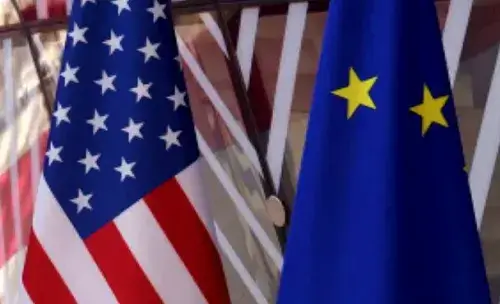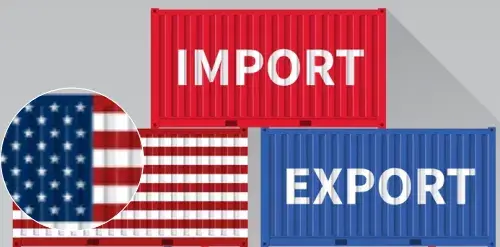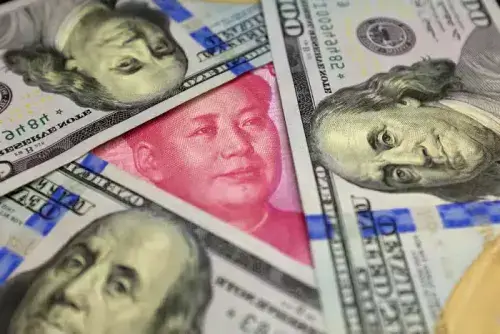Tariffs. The imposition of tariffs by the US on goods from Mexico, Canada, China, and potentially the EU, represents a significant shift in trade policy that could lead to a variety of outcomes, both positive and negative.
Here’s a potential scenario with several possible outcomes.
Tariffs Scenario.
Escalation of Trade Tensions.
1. Retaliatory Tariffs.
Negative Outcome:
Countries affected by the US tariffs may retaliate by imposing their own tariffs on US goods.
For example, China might impose tariffs on US agricultural products, while the EU could target US automobiles and machinery.
This could lead to a trade war, where escalating tariffs reduce the volume of trade between the US and these countries, harming businesses and consumers on all sides.
Positive Outcome.
In some cases, the threat of retaliatory tariffs might lead to negotiations.
Countries could come to the table to renegotiate trade agreements, potentially leading to more favorable terms for the US.
For example, the US might secure better access to foreign markets or stronger intellectual property protections.
2. Impact on Global Supply Chains.
Negative Outcome.
Many industries rely on global supply chains that could be disrupted by tariffs.
For example, US manufacturers that depend on Chinese components might face higher costs, leading to increased prices for consumers or reduced profitability for companies.
This could result in job losses and slower economic growth.
Positive Outcome.
Tariffs could incentivize companies to diversify their supply chains or bring production back to the US.
This could lead to a resurgence in domestic manufacturing and create jobs in the US, particularly in industries that have been heavily impacted by offshoring.
3. Economic Slowdown.
Negative Outcome.
A prolonged trade war could lead to a global economic slowdown.
Reduced trade volumes, higher prices, and increased uncertainty could dampen business investment and consumer spending.
This could lead to slower GDP growth or even a recession in the US and other affected countries.
Positive Outcome.
If the tariffs are temporary and lead to more balanced trade relationships, the short-term economic pain could be offset by long-term gains.
For example, if the US reduces its trade deficit and strengthens its domestic industries, the economy could become more resilient in the long run.
4. Currency Fluctuations.
Tariffs could lead to currency volatility as markets react to the changing trade landscape.
For example, if China devalues its currency to make its exports more competitive, it could lead to a currency war, where countries competitively devalue their currencies to gain a trade advantage.
This could destabilize global financial markets.
Positive Outcome.
Currency adjustments could help rebalance trade. For example, if the US dollar weakens relative to other currencies, US exports could become more competitive, potentially reducing the trade deficit.
5. Political Consequences.
Trade tensions could strain diplomatic relations between the US and its trading partners.
This could lead to a breakdown in cooperation on other important issues, such as security, climate change, or global health.
For example, if the EU feels unfairly targeted by US tariffs, it might be less willing to cooperate on sanctions against Russia or Iran.
Positive Outcome.
If the US successfully negotiates better trade deals, it could strengthen its geopolitical position.
For example, if the US secures concessions from China on trade, it might also gain leverage on other issues, such as intellectual property theft or military tensions in the South China Sea.
What Happens if Countries Do Not Pay the US Back?
If countries do not retaliate or “pay the US back” with their own tariffs, the immediate outcome might seem positive for the US, as it could enjoy the benefits of reduced imports and potentially increased domestic production.
However, there are still potential downsides.
Trade Deficit Persists. Without addressing the underlying causes of the trade deficit, such as differences in savings rates, investment opportunities, and consumption patterns.
Tthe US might not see a significant reduction in its trade deficit.
Even if countries do not retaliate immediately, the imposition of tariffs could strain relationships with key allies.
Over time, this could lead to a loss of influence and cooperation on global issues.
 Economic Distortions.
Economic Distortions.
Tariffs could lead to economic distortions, such as higher prices for consumers and inefficiencies in domestic industries that are protected from foreign competition.
This could reduce overall economic welfare in the US.
In summary, the imposition of tariffs by the US could lead to a range of outcomes, from increased domestic production and job creation to global economic slowdown and strained diplomatic relations.
The ultimate impact will depend on how other countries respond and whether the US can negotiate more favorable trade agreements.
Trump showed a table showing that goods made in the European Union would be subject to a 20% tariff. Goods made in China would be subject to a 34% tariff.
Goods from Japan, India and South Korea would be subject to tariffs of 24% to 26%, while goods from Vietnam would face a tariff of as high as 46%.
Trump reserved some of the heaviest blows for “countries that treat us badly,” including imposing tariffs of 49% on goods from Cambodia, 47% on Madagascar, 48% on Laos, 46% on Vietnam, 44% on Myanmar, 37% on Bangladesh and Serbia, 36% on Thailand, 34% on China, 32% on Indonesia and Taiwan, 31% on Switzerland, 30% on South Africa, 29% on Pakistan, 28% on Tunisia, 27% on Kazakhstan, 26% on India, 25% on South Korea, 24% on Japan and Malaysia, 21% on Côte d’Ivoire, 20% on goods from the EU and Jordan, 18% on Nicaragua, 17% on the Philippines and Israel, and 15% on goods from Norway.
Notably, Trump’s published list does not include the US’s neighbors Canada and Mexico, against which Trump has previously threatened to impose heavy tariffs.
The minimum tariff that will be applied to products from other countries will be 10%. Such a minimum tariff will also be applied to goods from the United Kingdom, Australia, New Zealand and Saudi Arabia, which are close US allies.
The minimum 10% tariff will also be applied to several European countries, such as Ukraine, Georgia, Armenia and Azerbaijan.
The 10% tariff is expected to come into effect on April 5, while the higher tariffs are planned to be introduced on April 9.
Have Good Day!





The US will impose an additional 10% tariff on all goods imported from China starting today.
US President Donald Trump justified this by citing both the negative balance of US trade with China and China’s insufficient action to prevent the flow of the synthetic drug fentanyl into the US.
China immediately took retaliatory steps, announcing that it would impose additional import tariffs on certain goods from the US starting February 10.
Beijing announced tariffs on U.S. energy and other products on Tuesday, Feb. 4, in retaliation for Washington’s decision to impose additional tariffs on Chinese imports.
China has also targeted several U.S. companies. The U.S. tariffs on Canadian and Mexican goods were supposed to take effect on Tuesday, but have been postponed.
When Pete Hegseth visits Iwo Jima this weekend, it’ll highlight how far US-Japan ties have come since they were on opposing sides in the battle for the Pacific island 80 years ago.
The US defense secretary’s trip will also show that it’s far from a stress-free relationship.
Even before he set off, Japan was reeling from President Donald Trump’s announcement yesterday of 25% tariffs on all auto imports. Further trade levies due April 2 will likely deal Tokyo another blow.
Japan is meanwhile bracing for US calls to raise defense outlays, perhaps during Hegseth’s meeting with his counterpart, Gen Nakatani.
True, Hegseth has his own challenges, with the ongoing furor over a private Signal chat.
Tokyo’s concerns go deeper, however.
Trump has questioned long-standing US security pledges to Japan, while media reports suggest Washington might dial back plans for a new military headquarters in the country. And yet, European-style soul-searching over concerns at US abandonment are far less pronounced in Japan.
That’s because Tokyo doesn’t see any realistic alternative to bandwagoning with the US, even if the ride gets bumpy.
Whereas European nations may be able to collectively deter the threat from Russia, the military challenge from China is just too great for Japan. Complex ties between Asian nations and Beijing’s economic pull mean there’s little prospect of a grand coalition to counter China.
Even when Japan and China try to get along, mistrust is never far away.
Recently, Tokyo has fretted about Chinese patrols around a group of Japanese-controlled islands that Beijing also claims. In an early call with Nakatani, Hegseth repeated a commitment to help Japan defend those islands.
US securities are being sold off, which means that at some point, faith in the US global economic and financial system as such may simply be lost.
China has retaliated with tariffs of another 54% on American goods, bringing the total to 84%. It is expected that the White House administration, led by Donald Trump, will continue to play this game.
Trump plans to send letters to more than 150 countries notifying them their tariff rates could be 10% or 15%, as he forges ahead with his bid to revamp global trade.
Meanwhile, in a move to help domestic producers, Canada will reduce the amount of foreign steel importers can bring into the country tariff-free,
while UK officials indicated they’re optimistic the Trump administration will soon agree to modify the domestic-production requirements holding up a trade agreement to lower US tariffs on British steel.
As the world digests Donald Trump’s self-declared tariff day, a heavy fog shrouds what happens next.
But it’s increasingly clear that the president’s rationale for imposing an array of seemingly arbitrary rates on countries’ exports to the US is every bit as political as it is economic.
Take Canada, where Prime Minister Mark Carney won a spring election largely on the premise that he could take on Trump and get the tariffs removed. Since then, the nation has mostly watched from the sidelines as Trump focused on hammering out deals with other trade partners.
Trump hiked Canada’s tariff rate to an eye-watering 35% — even as he gave Mexico a 90-day reprieve.
Trump cited a supposed failure to curb an “ongoing flood of fentanyl” into the US. That’s despite statistics showing the amount of the deadly drug intercepted at the northern US border is a tiny fraction of that seized at the Mexican frontier.
His other justification — and what really seems to have piqued him — was Canada’s decision to retaliate.
It’s part of a pattern of economic coercion, including targeting Brazil over its prosecution of former President Jair Bolsonaro and India over its purchases of Russian energy.
In Canada’s case, the headline number is misleading due to a carveout for goods shipped under the USMCA, the trade pact Trump negotiated in his first term. Those put Canada’s effective rate closer to 6% — not so bad compared with most other nations.
To be sure, some Canadian industries, like steel and lumber, are still facing steep levies. But overall, it may benefit the country right now to be left out as Trump strikes lopsided tariff deals elsewhere.
The economic hit is manageable for Carney as long the USMCA exemption remains in place.
Among those most surprised by the outcome of Trump’s tariff blitz was Switzerland, which suffered a 39% rate — one of the steepest reciprocal levies globally — threatening to leave the country’s key exports reeling.
Laos and Myanmar were meanwhile hit with a 40% import duty — the highest rate in the world behind only Syria at 41%. ???
In the US, consumer confidence is at its lowest level since the 2008 financial crisis – prices of goods and products have risen significantly, and the amount of credit for lower-income households has also increased.
This means that, unable to cope with expenses, people are forced to borrow.
Tourism revenues have also fallen significantly in the country. It is estimated that this sector has suffered losses of 25 to 30 billion dollars due to various travel bans, the aforementioned tariffs and also the rhetoric directed against immigrants.